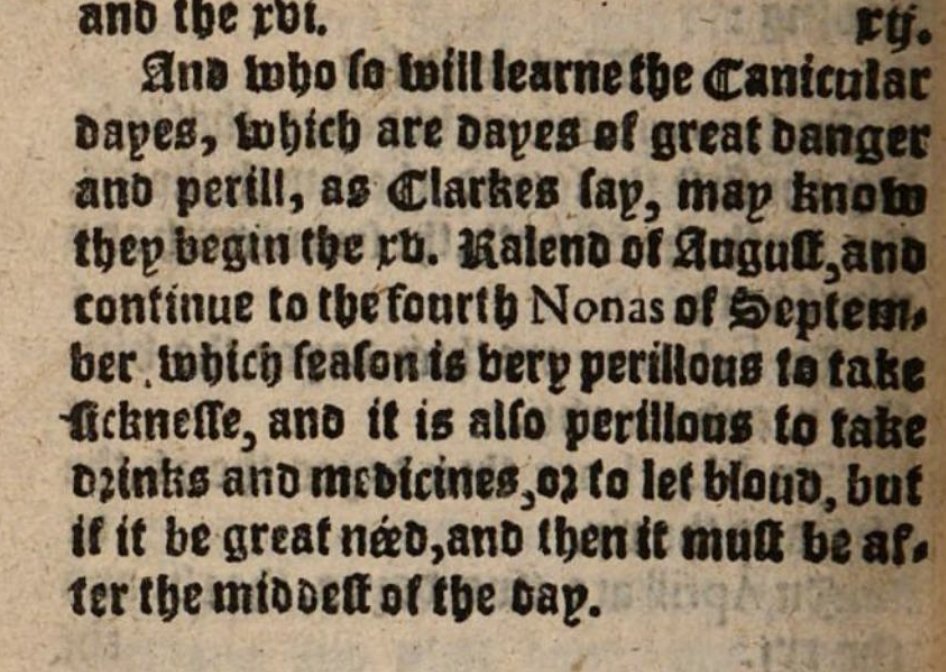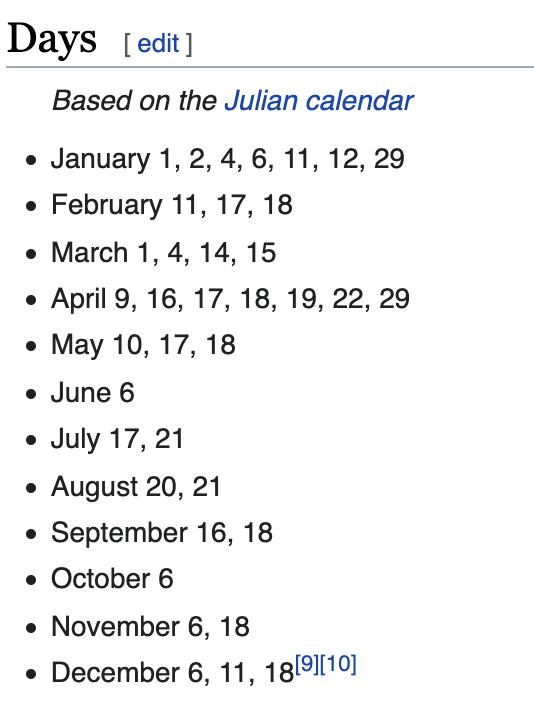
The unlucky days are:
Jan: 1, 2, 4,6,10, 15, 17,19
Feb 8, 10, 17
Mar 15,16,19
Apr: 15,21
May 7,15,20
Jun: 4,7
Jul 15,20
Aug 19, 20
Sep 6,7
Oct 6
Nov 6,19
Dec: 6,8,11 "Et alii dicunt (& others say?) the 15th, and 16th"
books.google.com/books?id=Z19jA…

Jan: 1, 2, 4,6,10, 15, 17,19
Feb 8, 10, 17
Mar 15,16,19
Apr: 15,21
May 7,15,20
Jun: 4,7
Jul 15,20
Aug 19, 20
Sep 6,7
Oct 6
Nov 6,19
Dec: 6,8,11 "Et alii dicunt (& others say?) the 15th, and 16th"
books.google.com/books?id=Z19jA…


Erra pater's outlook for these days is bleak:
"Masters of astronomy and physic that this craft first found, telleth the most perilous and most dangerous days of the year. In which if any man of woman be let blood of wound or vein, they shall die within 21 days following...
"Masters of astronomy and physic that this craft first found, telleth the most perilous and most dangerous days of the year. In which if any man of woman be let blood of wound or vein, they shall die within 21 days following...

... Or who so falleth into sickness on any of these days, they shall never escape it till they be dead. And who so taketh any great journey in any of these days to go from home shall be in danger to dye ere he come home again. And who so weddeth a wife in any of these days...
... they shall be soon parted, or else they shall live togethr with much sorrow. And whoseo beginneth in any of these days any great work, it shall never come to good end; and these are the days following...
<The table given in the 2nd tweet follows>
<The table given in the 2nd tweet follows>

TL; DR . If you fall sick on these days you will die, or else be sick until your death; wounds acquired on these days would be fatal within 3 weeks. Bad for travelling, marriage or starting anything
The ancients were really blunt with their predictions.
The ancients were really blunt with their predictions.
Erra pater also warns us against the "Canicular days":
"And who so will learn the canicular days, which are days of great danger and peril, as clerks say, may know they begin the xv kalend of August, and continue to the fourth Nonas of September, which season is very perilous...
"And who so will learn the canicular days, which are days of great danger and peril, as clerks say, may know they begin the xv kalend of August, and continue to the fourth Nonas of September, which season is very perilous...

... to take sickness, and it is also perilous to take drinks and medicines, or to let blood, but if it be great need, and then it must be after the middest of the day"
Going by this page penelope.uchicago.edu/~grout/encyclo…
it appears "xv Kal Aug" (i.e.? a.d.XV.Kal.Aug.) refers to what we'd call 18 July , and Fourth Nonas of September (i.e.? a.d.IV.Non.Sept.) would mean 2nd September
<Latinists, please feel free to correct me on this>
it appears "xv Kal Aug" (i.e.? a.d.XV.Kal.Aug.) refers to what we'd call 18 July , and Fourth Nonas of September (i.e.? a.d.IV.Non.Sept.) would mean 2nd September
<Latinists, please feel free to correct me on this>
It would be interesting to compare Erra pater's list of unlucky days with the "Tycho Brahe days" , which are held to be especially unlucky in the Danish folk magic tradition.
en.wikipedia.org/wiki/Tycho_Bra…
en.wikipedia.org/wiki/Tycho_Bra…

In turn, Rev. Cockayne's "Leechdoms, Wortcunning and Starcraft" translates this rather elaborate list of unlucky days from an ancient english manuscript books.google.com/books?id=UNU9A… 

• • •
Missing some Tweet in this thread? You can try to
force a refresh












